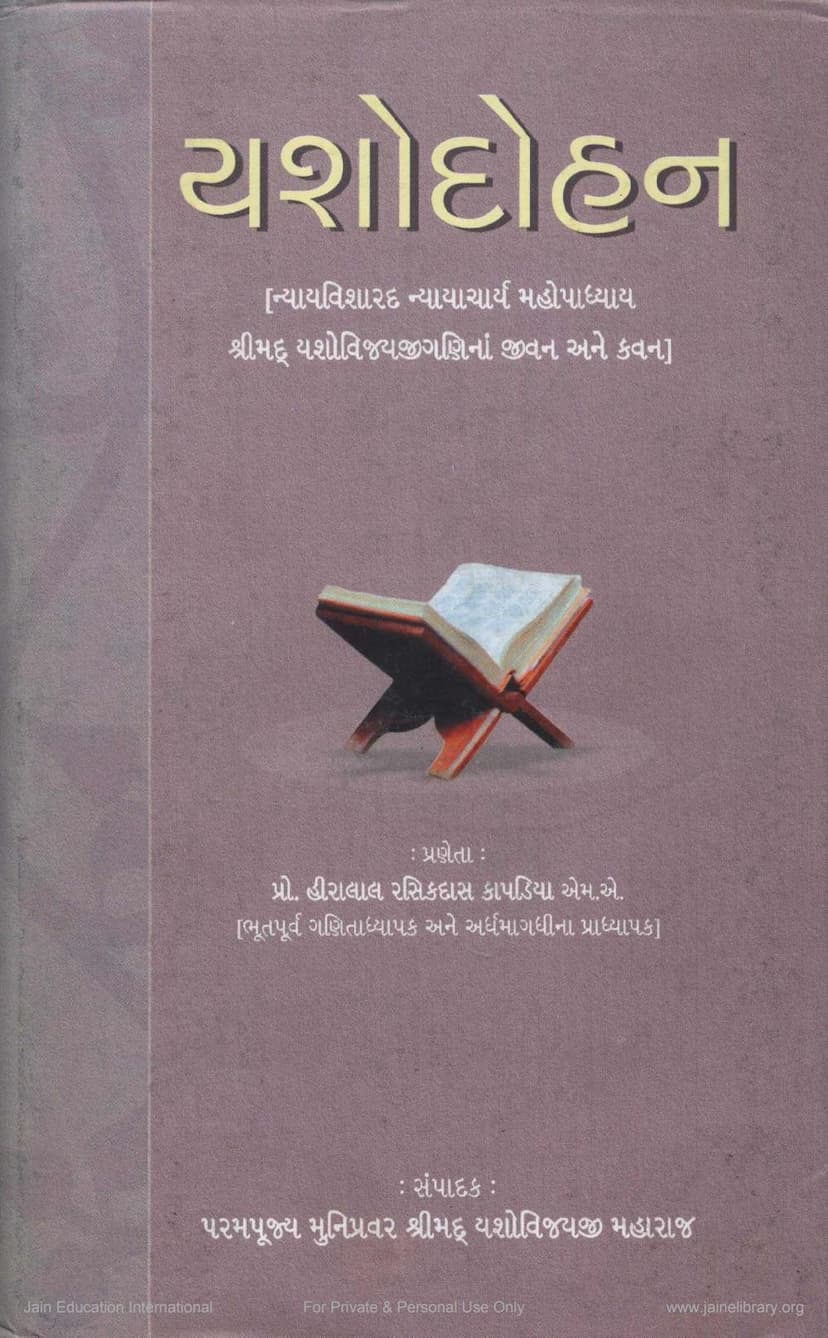Yashodohan
Added to library: September 2, 2025

Summary
Based on the provided pages from "Yashodohan," here's a comprehensive summary in English:
Book Title: Yashodohan Author(s): Yashovijay Pravartak (as the subject, with Prof. Hiralal Sikdas Kapadia as the creator and Muni Pravar Shrimad Yashovijayji Maharaj as the editor) Publisher: Shrutgyan Prasarak Sabha, Ahmedabad Catalog Link: https://jainqq.org/explore/004561/1
Overall Summary:
"Yashodohan" (which translates to "Collection of Yash") is a significant Jain text dedicated to the life and literary contributions (kavan) of the esteemed Jain scholar, philosopher, logician, and poet, Mahopadhyay Shrimad Yashovijayji Ganivini, who lived in the 17th century. The book aims to provide a comprehensive overview of his multifaceted personality, his spiritual depth, and his vast literary output, making it accessible to both Jain and non-Jain scholars.
Key Aspects of the Book:
-
Focus on Mahopadhyay Yashovijayji: The book is a tribute to Yashovijayji, highlighting his exceptional intellect, his mastery over various philosophical schools (Shad Darshan), his profound spiritual insights, and his prolific writing career. He is described as a rare individual whose very title, "Upadhyayji," became synonymous with his essence, indicating his unparalleled authority and the reverence he commanded. His teachings were considered to be of the highest caliber, akin to those of the omniscient Tirthankaras, earning him the epithet "Shrutkevali" (one who possesses all knowledge through scriptures).
-
Comprehensive Biography and Literary Analysis: The book is structured into two main parts:
- Khand 1: Bahya Jivan ni Ruprekha (Outline of External Life): This section delves into Yashovijayji's life journey, covering his early life (Grihvas), his initiation into monasticism and initial education, his specialized studies, his reception and eventual demise, and miscellaneous aspects related to his life.
- Khand 2: Yash-Kavan (Yash's Literary Works): This is the core of the book, providing a detailed exploration of his literary contributions. It's further divided into four sub-sections:
- Sarvajanin Yane Lakshnik Sahitya (Universal or Characteristic Literature): This covers his works on grammar, lexicon, prosody, rhetoric, drama, music, etc., noting his significant contributions in grammar (Ting-anvayokti) and other secular subjects.
- Dharmik Sahitya (Religious Literature): This is further divided into:
- Lalit Sahitya (Fine Literature): This includes his devotional literature like hymns, prayers, songs (stutis, stotras, stavans, pads, geets), biographies (charitras), and didactic literature (updeshik sahitya).
- Darshanik Sahitya (Philosophical Literature): This is a major focus, covering his deep dives into epistemology (Jnana Mimansa), logic and reasoning (Nyaya and Tarkashastra), metaphysics (Padartha Paramarsha or Dravya Vicharana), critique of other philosophies (Paramat Sameeksha), and spiritual exploration (Adhyatma and Jivan Shodhan).
- Prakirnak Yane Avashisht Sahitya (Miscellaneous or Residual Literature): This covers the remaining aspects of his work.
-
Extensive Research and Organization: The book is the result of extensive research by Prof. Hiralal R. Kapadia, who meticulously studied Yashovijayji's vast body of work, including both published and unpublished texts. The author adopted a systematic approach to classify and present Yashovijayji's literary output, considering factors like language (Sanskrit, Prakrit, Hindi, Gujarati), subject matter, and availability of the works. The editor, Muni Yashovijayji Maharaj, played a crucial role in refining and presenting this compilation.
-
Emphasis on Intellectual Prowess: The text highlights Yashovijayji's mastery in various fields, including Nyaya (Jain logic), which was particularly complex. His scholarly debates, especially his victory over a prominent non-Jain scholar in the royal court of Kashi, earning him the title "Nyayavisharada," are emphasized as a testament to his erudition. His ability to eloquently articulate Jain principles through the complex framework of Navya Nyaya is also noted, establishing him as a "Tarkashromani" (foremost logician).
-
Breadth of Literary Creation: Yashovijayji's literary output is described as vast, spanning hundreds of works across various languages (Sanskrit, Prakrit, Gujarati, Hindi) and subjects. His writings are characterized by their insightful analysis, their ability to reconcile different philosophical viewpoints (Samanyavada), and their accessibility to diverse audiences. He is credited with composing works that served to propagate Jain teachings and preserve ancient knowledge.
-
Avadhan Skills: The book also mentions Yashovijayji's exceptional intellectual abilities, specifically his 'Avadhan' skills – the miraculous feats of memory and concentration. His performances of these in the courts of Ahmedabad impressed everyone and elevated the prestige of Jain monks.
-
Place of Demise and Memorial: Yashovijayji breathed his last in Dabhoi, Gujarat, and a grand memorial stands at the site of his passing, commemorating his life and work.
-
Structure and Appendices: The book is well-structured with a detailed introduction (Uprodghat), an index of subjects, and five appendices that provide further details on his literary works, their linguistic classification, a list of authors, and miscellaneous special names.
In essence, "Yashodohan" serves as a monumental compilation and analysis of the life, intellect, and literary legacy of Mahopadhyay Shrimad Yashovijayji, portraying him as a towering figure in Jain tradition and Indian philosophy. The book's publication was a significant event, fulfilling a long-held desire to present his works and life to a wider audience.